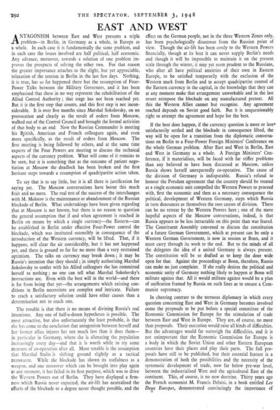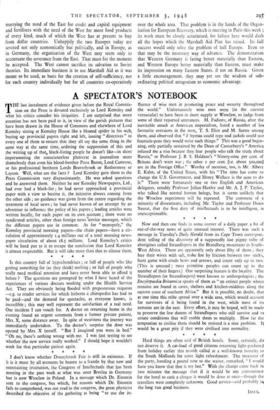EAST AND WEST A NTAGONISM between East and West presents
a triple problem—in Berlin, in Germany as a whole, in Europe as R whole. In each case it is fundamentally the same problem, and in each case the issues involved are half political, half economic. Any advance, moreover, towards a solution of one problem im- proves the prospects of solving the other two. For that reason the greater importance attaches to the slight, but yet appreciable, 'zelaxation of the tension in Berlin in the last few days. Nothing, it is true, has so far happened there but the resumption of Four- Power Talks between the Military Governors, and it has been emphasised that these in no way represent the rehabilitation of the Allied Control Authority ; that stage has not been reached yet. But it is the first step that counts, and this first step is not incon- siderable. It is over five months since Marshal Sokolovsky, on no provocation and clearly as the result of orders from Moscow, walked out of the Control Council and brought the formal activities of that body to an end. Now the Russian Commander is meeting his Bsitish, American and French colleagues again, and even more specifically, as the result of orders from Moscow. The 'first meeting is being followed by others, and at the same time experts of the Four Powers are meeting to discuss the technical aspects of the currency problem. What will come of it remains to be seen, but it is something that as the outcome of patient nego- tiation at Moscow the deadlock has been broken and the first hesitant steps towards a resumption of quadripartite action taken.
To say that is to say little, but it is all there is justification for saying yet. The Moscow conversations have borne this much fruit and no more. The real test of the success of the interchanges with M. Molotov is the maintenance or abandonment of the Russian blockade of Berlin. What undertakings have been given regarding that at Moscow is not known, but there is no reason to question the general assumption that if and when agreement is reached in Berlin on means by which a single currency—the Eastern—can be established in Berlin under effective Four-Power control the blockade, which was instituted ostensibly in consequence of the introduction of the Western currency, will be lifted. That, if it happens, will clear the air considerably, but it has not happened yet, and there is ground so far for no more than a very restrained optimism. The talks on currency may break down ; it may be Russia's intention that they should ; in simply authorising Marshal Sokolovsky to confer with his Allied colleagues she has committed herself to nothing ; no one can tell what Marshal Sokolovsky's instructions are. Even with the best will in the world—and there is far from being that yet—the arrangements which existing con- ditions in Berlin necessitate are complex and intricate. Failure to reach a satisfactory solution could have other causes than a ,determination not to reach one.
The trouble is that there is no means of divining Russia's real intentions. Any one of half-a-dozen hypotheses is possible. The most attractive, but also unfortunately the least probable, is that she has come to the conclusion that antagonism between herself and her former allies injures her not much less than it does them— in particular in Germany, where she is alienating the population increasingly every day—and that it is worth while to try some measure of co-operation after all. More tenable is the assumption that Marshal Stalin is shifting ground slightly as a tactical rnanceuvre. While the blockade has shown its usefulness as a weapon, and one moreover which can be brought into play again tit any moment, it has failed in its first purpose, which was to drive the Western Powers out of Berlin. They have displayed a firm- ness which Russia never expected, the air-lift has neutralised the effects of the blockade to a degree never thought possible, and the effect on the German people, not in the three Western Zones only, has been psychologically disastrous from the Russian point of view. Though the air-lift has been costly to the Western Powers financially, though at its best it can never supply Berlin's needs and though it will be impossible to maintain it on the present scale through the winter, it may yet seem prudent to the Russians, who after all have political anxieties of their own in Eastern Europe, to be satisfied temporarily with the exclusion of the Western mark from Berlin and to accept quadripartite control of the Eastern currency in the capital, in the knowledge that they can at any moment make that arrangement unworkable and in the last resort reimpose the blockade on any manufactured pretext. All this the Western Allies cannot but recognise. Any agreement reached depends on Soviet good faith. But it is unquestionably right to attempt the agreement and hope for the best.
If the best does happen, if the currency question is more or less* satisfactorily settled and the blockade in consequence lifted, the way will be open for a transition from the diplomatic conversa- tions on Berlin to a Four-Power Foreign Ministers' Conference on the whole German prOblem. After East and West in Berlin, East and West in Germany as a whole. A Foreign Ministers' Con- ference, if it materialises, will be faced with far stiffer problems than any believed to have been discussed at Moscow, unless Russia shows herself unexpectedly co-operative. The cause of the division of Germany is indisputable. Russia's refusal to honour the Potsdam agreement that the country should be treated as a single economic unit compelled the Western Powers to proceed with, first the economic and then as a necessary consequence the political, development of Western Germany, steps which Russia in turn denounces as themselves the root causes of division. There can be no retreat by the Western Powers here ; one of the more hopeful aspects of the Moscow conversations, indeed, is that Russia appears to be less intractable on this point than was feared. The Constituent Assembly convened to discuss the constitution of a future German Government, which at present can be only a Western German Government, is now in session at Bonn, and it must carry through its work to the end. But to the minds of all the delegates the idea of a united Germany is always present. The constitution will be so drafted as to keep the door wide open for that. Against the proceedings at Bonn, therefore, Russia can make no, just complaint. If she really desires the political and economic unity of Germany nothing likely to happen at Bonn will militate against that. All it would militate against would be a plan of unification framed by Russia on such lines as to ensure a Com- munist supremacy.
In cheering contrast to the tortuous diplomacy in which every question concerning East and West in Germany becomes involved come the proposals to be put before a special committee of the Economic Commission for Europe for the stimulation of trade between East and West in Europe. They are, of course, no more than proposals. Their execution would raise all kinds of difficulties. But the advantages would far outweigh the difficulties, and it is not unimportant that the Economic Commission for Europe is a body in which the Soviet Union and other Eastern European countries have their places and play their parts. The full pro- posals have still to be published, but their essential feature is a demonstration of both the possibilities and the necessity of the systematic development of trade, now far below pre-war level, between the industrialised West and the agricultural East of the continent. This, of course, is no new doctrine. Thirty years ago the French economist M. Francis Delaisi, in a book entitled Les Degx Europes, demonstrated convincingly the importance of marrying the need of the East for credit and capital equipment and fertilisers with the need of the West for more food products of every kind, much of which the West has at present to buy from dollar countries. Unhappily the two Europes today are severed not only economically but politically, and in Europe, as in Germany, the organisation of the West may seem only to accentuate the severance from the East. That must for the moment be accepted. The West cannot sacrifice its salvation to Soviet theories. Its immediate business is to use Marshall Aid as it was meant to be used, as basis for the creation of self-sufficiency, not for each country individually but for all countries co-operatively over the whole area. That problem is in the hands of the Organ- isation for European Recovery, which is meeting in Paris this week ; its work must be closely scrutinised, for failure here would dash all the hopes which the Marshall Aid Plan has raised. Its full success would only solve the problem of half Europe. Even so that may be the necessary way of advance. The demonstration that Western Germany is faring better materially than Eastern, and Western Europe better materially than Eastern, must make its impression on many Eastern States, if not on Russia. Given a little encouragement, they may yet see the wisdom of sub- ordinating political antagonism to economic advantage.



































 Previous page
Previous page